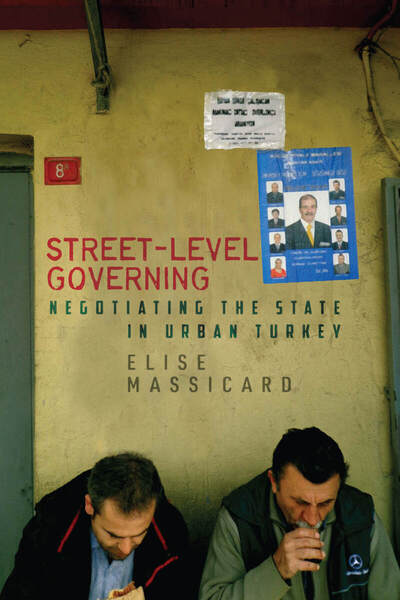
June 2022
344 pages.
from $32.00
Paperback now $16.00 (50% off)
Hardcover ISBN: 9781503628410
Paperback ISBN: 9781503631854
Ebook ISBN: 9781503631861
Muhtars, the lowest level elected political position in Turkey, hold an ambiguously defined place within the administrative hierarchy. They are public officials, but local citizens do not always associate them with the central government. Street-Level Governing is the first book to investigate how muhtars carry out their role—not only what they are supposed to do, but how they actually operate—to provide an ethnographic study of the state as viewed from its margins. It starts from the premise that the seeming "margin" of state administration is not peripheral at all, but instructive as to how it functions.
As Elise Massicard shows, muhtars exist at the intersection of everyday life and the exercise of power. Their position offers a personalized point of contact between citizens and state institutions, enabling close oversight of the citizenry, yet simultaneously projecting the sense of an accessible state to individuals. Challenging common theories of the state, Massicard outlines how the position of the muhtar throws into question an assumed dichotomy between domination and social resistance, and suggests that considerations of circumvention and accommodation are normal attributes of state-society functioning.
About the author
Elise Massicard is Research Professor at the Centre national de la recherche scientifique / Centre for International Studies, Sciences Po. She is the author of The Alevis in Turkey and Europe: Identity and Managing Territorial Diversity (2012).
"Street-Level Governing is a brilliant and engaging study that overturns dyed-in-the-wool ideas about the nature of the state and modernity. With a sophisticated command of the literature leavened by on-the-ground observation, Elise Massicard makes an excellent contribution to a new global scholarship of informality in politics and politics as performance."
—Jenny White, Stockholm University, author of Turkish Kaleidoscope
"Street-Level Governing is one of the most interesting and original recent books I have read on contemporary Turkey. Based on ethnographic fieldwork and deep knowledge of Turkish politics and society, Elise Massicard gives us a vivid and up-close account of the muhtarlık in the context of state-society relations in Turkey."
—Reşat Kasaba, University of Washington, author of A Moveable Empire
"Street-Level Governing is a commendable study that approaches contemporary Turkey from an original angle with both rigour and scholarship. It certainly deserves to be read and discussed."
—Marc Juyient, Manara Magazine
"Massicard's outstanding book on the neglected urban agency of muhtarlık crucially challenges major ideas on urban politics, stands as a methodological resource, and contributes to the literature on urban studies by speaking to scholars' broader interest in how local actors and their interrelations with complex urban outcomes have been reproduced."
—Gülşah Aykaç, Urban Studies
"Street-Level Governing, as implied by the title, rejects traditional notions about the Turkish state and its bureaucracy to build on Migdal's state-in-society framework and the rich ethnographic scholarship on Turkey it has recently engendered. However, whereas this new body of work focuses on the marginalized, studying the ever-present muhtar helps Massicard reveal how even mundane interactions shape the contours of the state."
—Devrim Yavuz, Journal of the Ottoman and Turkish Studies Association
"Moving beyond the clientelism-versus-governance divide and engaging critically with fields of the political sociology and the anthropology of state, Massicard's excellent book on the dynamics of urban politics in Turkey examines state-society interaction in everyday life and successfully demonstrates how they mutually transform, constitute, and produce each other on the ground."
—Osman Savaşkan, Political Science Quarterly